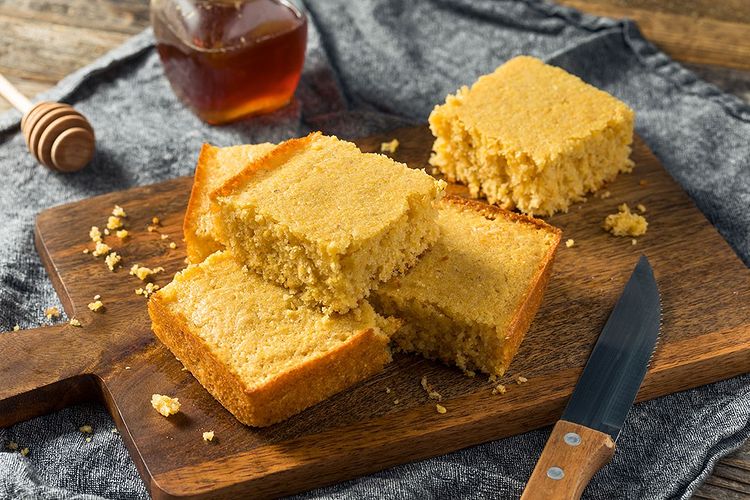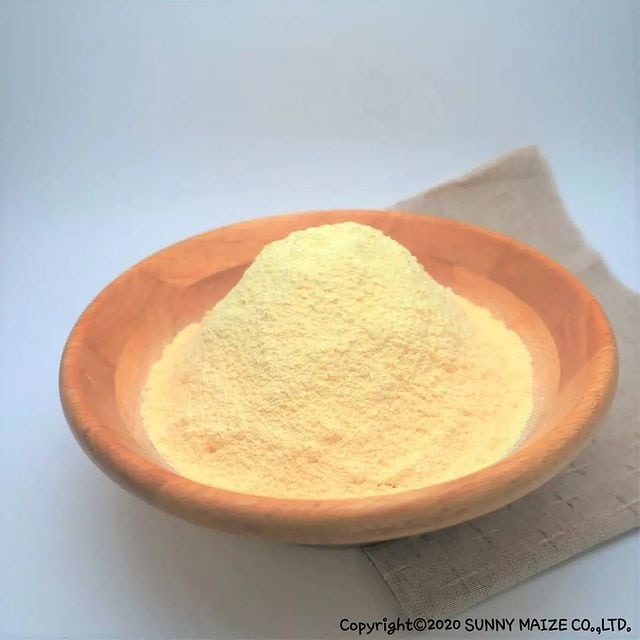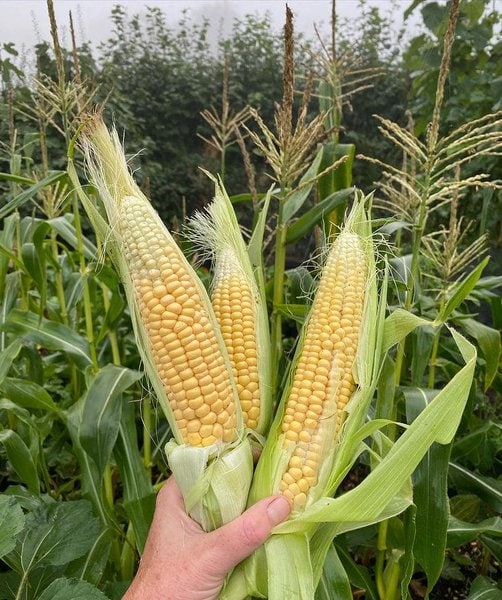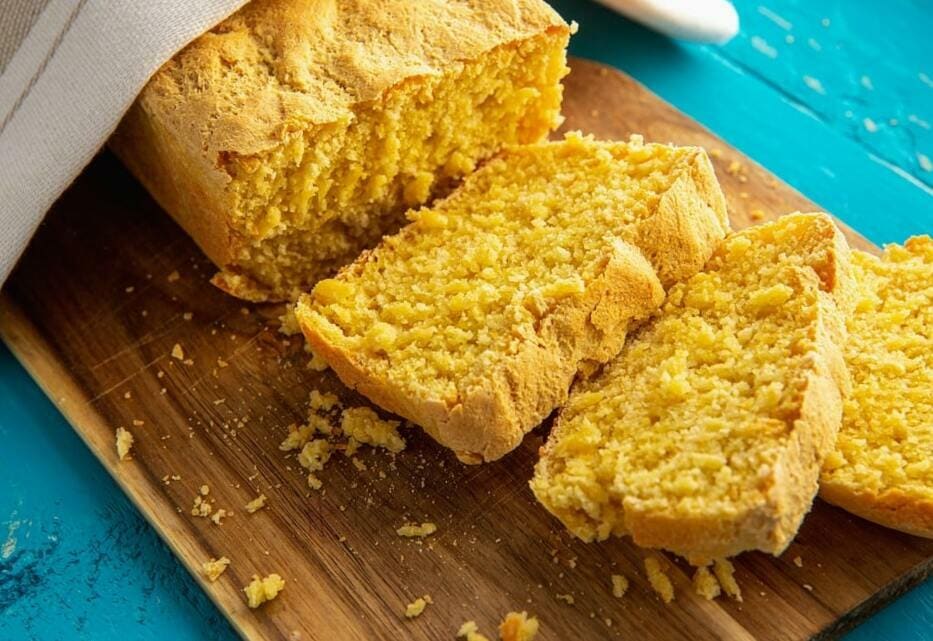It is a reasonably challenging task to know how to spoil our furry friends, and you must be wondering whether a specially prepared cornbread treat with ingredients such as wheat flour, cornmeal, milk, baking powder, and eggs won’t place any strain on your dog’s well-being.
So, can dogs eat cornbread? Strictly speaking for cornbread only, you will be doing no harm to your pooch if fed in small amounts – advisably on special occasions only. However, it’s important to note that utmost care must be taken when choosing the constituents of this meal, as some ingredients of the snack could offset an allergic reaction in your dog.
Having said that, you must be wondering what ingredients to avoid using when you intend to serve a small plate of cornbread to your furry companion. In this article, you will be able to see for yourself how safe it is for your dog to eat cornbread and what you should do if your dog can’t.
In fact, you will be gaining knowledge on how best to make this snack for your pet, the best kind of corn for your pooch to eat, ingredients to make use of, and the likes. However, before we delve into all of this, let’s take a look at whether or not it is safe for your dog to eat cornbread.
Is It Safe For Dogs To Eat Cornbread?

Yes, it is safe to feed your pooch with cornbread. However, it is worth mentioning that a bite or two of cornbread is enough to feed your furry friend with, as moderation should be your watchword from the moment you decide to provide your dog with a cornbread snack.
While there’s no denying that your pooch’s beautiful, googly eyes will tempt you into wanting to go beyond the limit, you should, as much as possible, avoid adding cornbread to your pet’s regular diet.
Cornbread is suitable as a treat for a reward, but it really shouldn’t be more than that – cornbread shouldn’t become a staple part of your pooch’s diet. Moreover, if you have a track record of succumbing to your pet’s cute tempting eyes, it’s advisable that you go with a more pet-friendly treat.
What Happens If A Dog Eats Cornmeal?
As earlier inferred, feeding your dog with cornbread comes with a number of specifics, and erring on these laid principles could upset the well-being of your pet.
Cornbread is not unsafe for dogs to munch on, neither does it offer any health benefits. Nutritionally, cornbread offers nothing but sugar and calories, in large quantities, to your furry companion. And allowing your pooch to consume sugar in large amounts continuously can lead to obesity and other weight-related issues.
As we all know, cornbread can be made from scratch or from a ready-made mix. The major advantage of the former is that it helps you to effectively monitor the quantity and quality of ingredients that would make up the snack.
And while it’s not entirely unsafe, if you’re making cornbread from a mix, ensure that you take a careful look at the ingredients list in order to evaluate the eventual content of your cornbread; This is an essential part of the whole process of feeding your dog, as certain ingredients can upset your pet’s stomach.
Can Corn Upset A Dog’s Stomach?
Extra caution must be employed when choosing the ingredients – or the mix – for cornbread, while the quantity being served to the dog must be strictly monitored, as you could end up punishing your furry friend with diarrhea or any other gastrointestinal disorder if proper care is not taken.
Similarly, food allergies are common among dogs, and feeding cornbread to a pooch with a history of corn allergies can lead to a severe allergic reaction with devastating side effects.
Can Dogs Be Allergic To Cornmeal?

Yes, dogs can suffer an allergic reaction to cornmeal, although it is considerably rare for dogs to experience an allergic reaction to cornmeal.
Interestingly, cornmeal is no stranger when it comes to a dog’s regular diet, as it has often played the role of a filler. However, cornmeal is usually not an essential part of dogs’ diet, as many dogs have difficulty processing the food material.
Even after obeying the rule of moderation regarding feeding your pooch with cornbread, it’s still of utmost importance that you keep an eye out for any form of reaction in your dog to the cornbread, as an allergic reaction is very much a possibility.
That said, having fed them with this meal more than once or twice, you should be able to tell whether or not your pooch is allergic to cornmeal.
What Are The Symptoms Of Cornmeal Allergy In Dogs?
There are a few symptoms of sensitivity to look out for when your dog is on a diet that has high cornmeal content, but some of the more prominent symptoms include unhealthy weight gain, itchy skin, ear infections, and a dry cough.
While these symptoms are consistent with that of a grain allergy, a chat with your furry friend’s vet is in order, and switching your dog’s diet – preferably to a grain-free diet – should be top on your list of priorities.
Of course, your canine buddy could be insensitive to cornmeal. Hence, an occasional treat of your delicious cornbread will certainly do no harm.
And at this stage, you’re probably wondering how best to make cornbread with your pooch in mind. Perhaps, knowing the best kind of corn to use is a good start to completing that quest.
What Kind Of Corn Is Good For Dogs?
If a pooch doesn’t have any corn allergies, you can feed such a dog with either plain corn, raw or cooked sweet corn. That said, corn being fed to a pooch should be in grains, as corn on the cob can be dangerous to a dog if ingested.
Can Dogs Eat Corn Cobs?
Apart from the fact that corn cobs are indigestible, in the summer of 2019, a report emerged stating that the most common barbecue injuries treated by vets in the previous year were as a result of pets eating corn cobs. And although this report came from the table of the British Veterinary Association, it doesn’t make it any less scary for pets in America.
Without any doubt, corn cobs are dangerous for your dogs, as they can cause gastrointestinal obstruction. And as our canine friends are known scavengers and typically stoic, you might not be able to quickly detect if they are suffering from gastrointestinal obstruction, which makes a situation like this even more dangerous.
Vomiting, loss of appetite, lethargy, and pain are associated with gastrointestinal blockage. So, if you notice these symptoms in your dog, a trip to the vet is in order. Be it a barbecue party or when preparing cornbread for your fido, ensure that you don’t have corn cobs lying around.
Can Dogs Eat Raw Sweet Corn?
Interestingly, sweet corn is a fantastic choice of corn to feed your dog. Provided that your dog isn’t allergic to grains, it’s safe to include sweet corn in your pet’s diet either as a regular fixture or as a one-off snack like cornbread.
Sweet corn offers an outstanding nutritional value in vitamins and minerals, but it’s advisable that you provide the cooked or grilled sweet corn to your dog only in small amounts.

Can You Give Corn Kernels To Dogs?
As earlier mentioned, corn kernels are not easily digestible in dogs, especially when they are raw; Hence, there is no cause for alarm should you find some grains in your furry bud’s poop.
Although you can’t give corn cobs to your pooch, you can still manage to slip some corn kernels in their meal every now and then. And while it is generally safe for them to eat the grains, ensure that they are under your close watch so as to help out if they are choking on the grains.
Having detached the kernels from the cobs, resist the temptation to salt the grains to prevent dehydration in your dog.
Is Cooked Corn Good For Dogs?
Having established that sweet corn is good for your pup, you’re left with a choice of how to serve them – Do they want it grilled or cooked?
While you might find it a little difficult to give a clear answer to that, it wouldn’t matter anyway, as your dog is at no risk of harm whether they consume either grilled or cooked corn.
Is Corn Digestible By Dogs?
Quite frankly, the belief that corn is highly digestible is fairly mythical, as it doesn’t represent the full truth. A corn kernel can’t be digested whole as it is. Hence, the need to have it refined into flour or cornmeal and cooked for your dog to feed on and digest without any trouble.
It’s worth mentioning that the finer the flour particles, the easier for your pet to digest the corn. However, digestible or not, corn barely offers any nutritional value to your dog. And no matter how tempting it seems, don’t throw an ear of corn at your best guy.





